(完整版)人教版八年级英语上册第一单元知识点归纳
- 格式:doc
- 大小:66.55 KB
- 文档页数:4
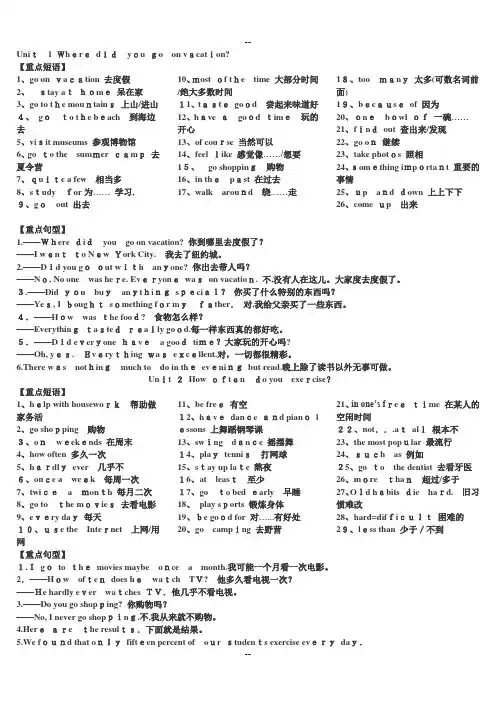
Unit 1 Wheredidyou go on vacation? 【重点短语】1、go on vacation 去度假2、stay athome呆在家3、go to the mountains上山/进山4、goto the beach到海边去5、visit museums 参观博物馆6、go to the summer camp去夏令营7、quite a few相当多8、studyfor为…… 学习,9、goout 出去10、most of the time 大部分时间/绝大多数时间11、tastegood尝起来味道好12、have agood time玩的开心13、of course 当然可以14、feel like 感觉像……/想要15、go shopping购物16、in thepast 在过去17、walk around绕……走18、toomany太多(可数名词前面)19、becauseof 因为20、onebowl of一碗……21、findout 查出来/发现22、go on继续23、take photos 照相24、something important 重要的事情25、up and down 上上下下26、come up出来【重点句型】1.——Where didyou go on vacation? 你到哪里去度假了?——I wentto New York City.我去了纽约城。
2.——Did you goout with anyone? 你出去带人吗?——No, No one was here. Everyonewason vacation. 不,没有人在这儿。
大家度去度假了。
3.——Did you buyanythingspecial?你买了什么特别的东西吗?——Yes, I boughtsomething for myfather.对,我给父亲买了一些东西。
4.——How was the food?食物怎么样?——Everythingtastedreally good.每一样东西真的都好吃。
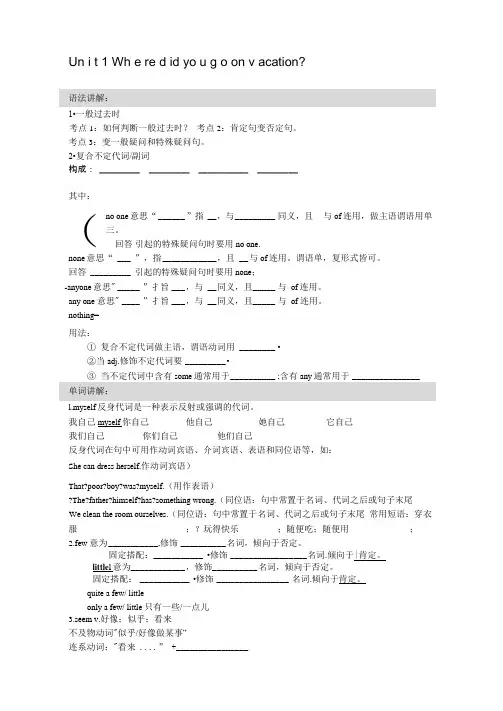
Un i t 1 Wh e re d id yo u g o on v acation?1•一般过去时考点1:如何判断一般过去时?考点2:肯定句变否定句。
考点3:变一般疑问和特殊疑问句。
2•复合不定代词/副词构成: _________ _________ ___________ _________其中:(no one意思“______ ”指 __ ,与_________ 同义,且与of连用,做主语谓语用单三。
回答引起的特殊疑问句时要用no one.none意思“ ___ ”,指____________ ,且 __ 与of连用。
谓语单,复形式皆可。
回答 _________ 引起的特殊疑问句时要用none;-anyone意思" _____ ”扌旨___ ,与 __ 同义,且_____ 与of连用。
_any one 意思" ____ ”扌旨___ ,与 __ 同义,且_____ 与of 连用。
nothing= _________________用法:① 复合不定代词做主语,谓语动词用 ________ •②当adj.修饰不定代词要_________ •③ 当不定代词中含有some通常用于__________ ;含有any通常用于_______________我自己myself你自己他自己她自己它自己我们自己你们自己他们自己反身代词在句中可用作动词宾语、介词宾语、表语和同位语等,如:She can dress herself.作动词宾语)That?poor?boy?was?myself.(用作表语)Thefatherhimselfhassomething wrong.(同位语:句中常置于名词、代词之后或句子末尾We clean the room ourselves.(同位语:句中常置于名词、代词之后或句子末尾常用短语:穿衣服;?玩得快乐;随便吃;随便用;2.few 意为___________,修饰__________ 名词,倾向于否定。
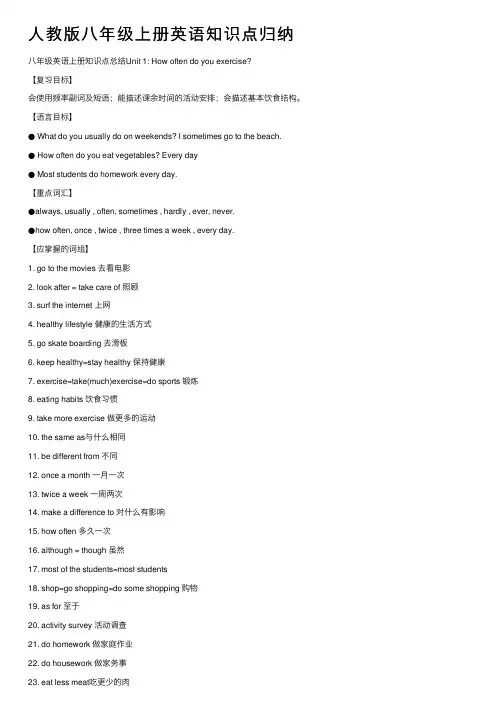
⼈教版⼋年级上册英语知识点归纳⼋年级英语上册知识点总结Unit 1: How often do you exercise?【复习⽬标】会使⽤频率副词及短语;能描述课余时间的活动安排;会描述基本饮⾷结构。
【语⾔⽬标】● What do you usually do on weekends? I sometimes go to the beach.● How often do you eat vegetables? Every day● Most students do homework every day.【重点词汇】●always, usually , often, sometimes , hardly , ever, never.●how often, once , twice , three times a week , every day.【应掌握的词组】1. go to the movies 去看电影2. look after = take care of 照顾3. surf the internet 上⽹4. healthy lifestyle 健康的⽣活⽅式5. go skate boarding 去滑板6. keep healthy=stay healthy 保持健康7. exercise=take(much)exercise=do sports 锻炼8. eating habits 饮⾷习惯9. take more exercise 做更多的运动10. the same as与什么相同11. be different from 不同12. once a month ⼀⽉⼀次13. twice a week ⼀周两次14. make a difference to 对什么有影响15. how often 多久⼀次16. although = though 虽然17. most of the students=most students18. shop=go shopping=do some shopping 购物19. as for ⾄于20. activity survey 活动调查21. do homework 做家庭作业22. do housework 做家务事23. eat less meat吃更少的⾁24. junk food 垃圾⾷物25. be good for 对什么有益26. be bad for 对什么有害27. want to do sth 想做某事28. want sb to do sth 想某⼈做某事29. try to do sth 尽量做某事30. come home from school 放学回家31. of course = certainly = sure 当然32. get good grades 取得好成绩33. some advice34. hardly=not nearly / almost not ⼏乎不35. keep/be in good health 保持健康36. b e stressed out 紧张的,有压⼒的37. take a vacation 去度假48. g et back 回来【应掌握的句⼦】1. How often do you exercise? 你(你们)多久锻炼⼀次⾝体?How often + 助动词do(does 或did) + 主语+ do sth.? 疑问词how often 是问频率(多久⼀次),(在这⾥助动词do(does 或did) 是起帮助构成疑问的作⽤)与⼀般现在时或⼀般过去时连⽤,回答⼀般是⽤表⽰频率的副词,如:once, twice, three times , sometimes, often, quite, often, never, every day, once a week , twice a month , three times a month , three or four times a month 等。
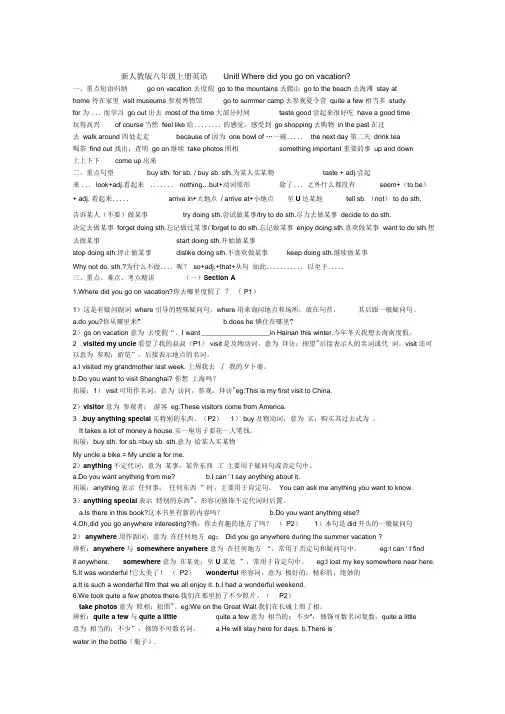
新人教版八年级上册英语Unitl Where did you go on vacation?一、重点短语归纳go on vacation 去度假go to the mountains 去爬山go to the beach去海滩stay athome 待在家里visit museums 参观博物馆go to summer camp去参观夏令营quite a few 相当多studyfor为 ... 而学习go out出去most of the time大部分时间taste good尝起来很好吃have a good time玩得高兴of course当然feel like给........ 的感觉;感受到go shopping去购物in the past在过去walk around 四处走走because of 因为one bowl of …一碗..... the next day 第二天drink tea喝茶find out 找出;查明go on继续take photos照相something important 重要的事up and down上上下下come up出来二、重点句型buy sth. for sb. / buy sb. sth.为某人买某物taste + adj.尝起来... look+adj.看起来 ....... nothing…but+动词原形除了... 之外什么都没有seem+(to be)+ adj. 看起来..... arrive in+大地点/ arrive at+小地点至U达某地tell sb. (not) to do sth.告诉某人(不要)做某事try doing sth.尝试做某事/try to do sth.尽力去做某事decide to do sth.决定去做某事forget doing sth.忘记做过某事/ forget to do sth.忘记做某事enjoy doing sth.喜欢做某事want to do sth.想去做某事start doing sth.开始做某事stop doing sth.停止做某事dislike doing sth.不喜欢做某事keep doing sth.继续做某事Why not do. sth.?为什么不做.... 呢?so+adj.+that+从句如此........... 以至于.....三、重点、难点、考点精讲(一)Section A1.Where did you go on vacation?你去哪里度假了?( P1)1)这是有疑问副词where引导的特殊疑问句,where用来询问地点和场所,放在句首,其后跟一般疑问句。
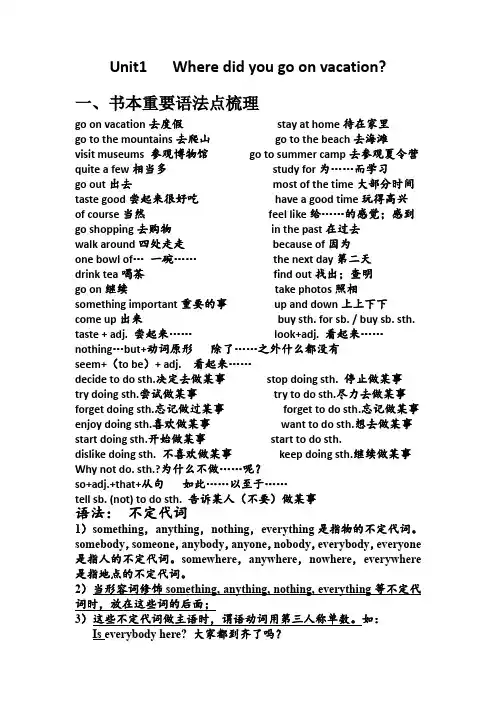
Unit1 Where did you go on vacation?一、书本重要语法点梳理go on vacation去度假stay at home待在家里go to the mountains去爬山go to the beach去海滩visit museums 参观博物馆go to summer camp去参观夏令营quite a few相当多study for为……而学习go out出去most of the time大部分时间taste good尝起来很好吃have a good time玩得高兴of course当然feel like给……的感觉;感到go shopping去购物in the past在过去walk around四处走走because of因为one bowl of…一碗……the next day第二天drink tea喝茶find out找出;查明go on继续take photos照相something important重要的事up and down上上下下come up出来buy sth. for sb. / buy sb. sth. taste + adj. 尝起来……look+adj. 看起来……nothing…but+动词原形除了……之外什么都没有seem+(to be)+ adj. 看起来……decide to do sth.决定去做某事stop doing sth. 停止做某事try doing sth.尝试做某事try to do sth.尽力去做某事forget doing sth.忘记做过某事forget to do sth.忘记做某事enjoy doing sth.喜欢做某事want to do sth.想去做某事start doing sth.开始做某事start to do sth.dislike doing sth. 不喜欢做某事keep doing sth.继续做某事Why not do. sth.?为什么不做……呢?so+adj.+that+从句如此……以至于……tell sb. (not) to do sth. 告诉某人(不要)做某事语法:不定代词1)something,anything,nothing,everything是指物的不定代词。
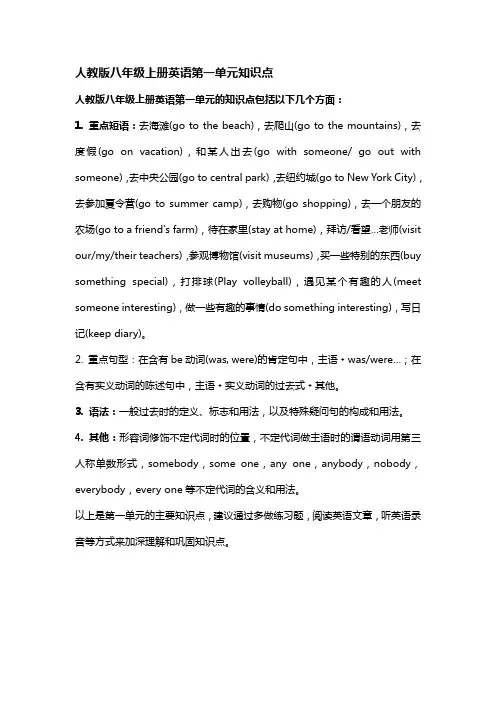
人教版八年级上册英语第一单元知识点人教版八年级上册英语第一单元的知识点包括以下几个方面:1. 重点短语:去海滩(go to the beach),去爬山(go to the mountains),去度假(go on vacation),和某人出去(go with someone/ go out with someone),去中央公园(go to central park),去纽约城(go to New York City),去参加夏令营(go to summer camp),去购物(go shopping),去一个朋友的农场(go to a friend's farm),待在家里(stay at home),拜访/看望…老师(visit our/my/their teachers),参观博物馆(visit museums),买一些特别的东西(buy something special),打排球(Play volleyball),遇见某个有趣的人(meet someone interesting),做一些有趣的事情(do something interesting),写日记(keep diary)。
2. 重点句型:在含有be动词(was, were)的肯定句中,主语﹢was/were…;在含有实义动词的陈述句中,主语﹢实义动词的过去式﹢其他。
3. 语法:一般过去时的定义、标志和用法,以及特殊疑问句的构成和用法。
4. 其他:形容词修饰不定代词时的位置,不定代词做主语时的谓语动词用第三人称单数形式,somebody,some one,any one,anybody,nobody,everybody,every one等不定代词的含义和用法。
以上是第一单元的主要知识点,建议通过多做练习题,阅读英语文章,听英语录音等方式来加深理解和巩固知识点。
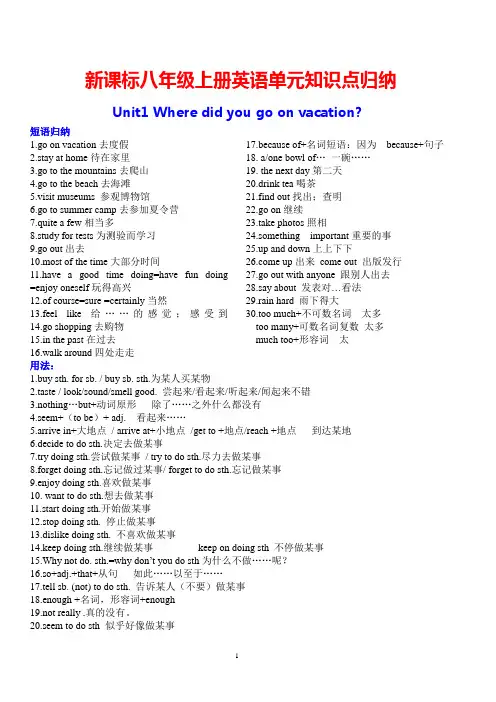
新课标八年级上册英语单元知识点归纳Unit1 Where did you go on vacation?短语归纳1.go on vacation去度假2.stay at home待在家里3.go to the mountains去爬山4.go to the beach去海滩5.visit museums 参观博物馆6.go to summer camp去参加夏令营7.quite a few相当多8.study for tests为测验而学习9.go out出去10.most of the time大部分时间11.have a good time doing=have fun doing =enjoy oneself玩得高兴12.of course=sure =certainly当然13.feel like给……的感觉;感受到14.go shopping去购物15.in the past在过去16.walk around四处走走17.because of+名词短语:因为because+句子18. a/one bowl of…一碗……19. the next day第二天20.drink tea喝茶21.find out找出;查明22.go on继续23.take photos照相24.something important重要的事25.up and down上上下下e up出来come out 出版发行27.go out with anyone 跟别人出去28.say about 发表对…看法29.rain hard 雨下得大30.too much+不可数名词太多too many+可数名词复数太多much too+形容词太用法:1.buy sth. for sb. / buy sb. sth.为某人买某物2.taste / look/sound/smell good. 尝起来/看起来/听起来/闻起来不错3.nothing…but+动词原形除了……之外什么都没有4.seem+(to be)+ adj. 看起来……5.arrive in+大地点/ arrive at+小地点/get to +地点/reach +地点到达某地6.decide to do sth.决定去做某事7.try doing sth.尝试做某事/ try to do sth.尽力去做某事8.forget doing sth.忘记做过某事/ forget to do sth.忘记做某事9.enjoy doing sth.喜欢做某事10. want to do sth.想去做某事11.start doing sth.开始做某事12.stop doing sth. 停止做某事13.dislike doing sth. 不喜欢做某事14.keep doing sth.继续做某事keep on doing sth 不停做某事15.Why not do. sth.=why don’t you do sth为什么不做……呢?16.so+adj.+that+从句如此……以至于……17.tell sb. (not) to do sth. 告诉某人(不要)做某事18.enough +名词,形容词+enough19.not really .真的没有。
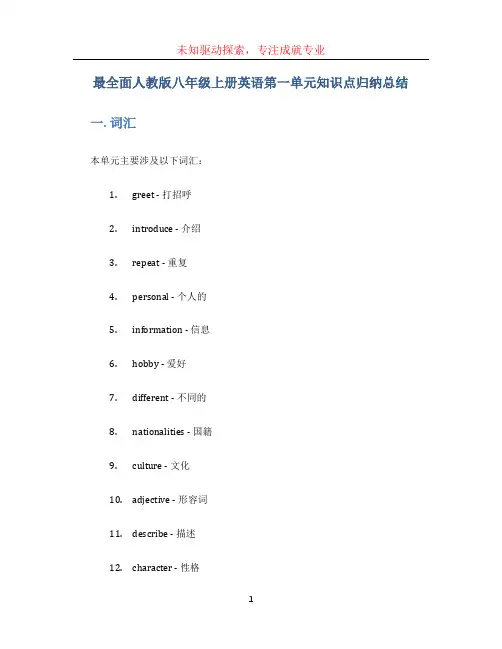
最全面人教版八年级上册英语第一单元知识点归纳总结一. 词汇本单元主要涉及以下词汇:1.greet - 打招呼2.introduce - 介绍3.repeat - 重复4.personal - 个人的rmation - 信息6.hobby - 爱好7.different - 不同的8.nationalities - 国籍9.culture - 文化10.adjective - 形容词11.describe - 描述12.character - 性格二. 语法本单元的语法重点包括:1.be动词(am, is, are)–表示个人特征和国籍,e.g. I am from China.–表示人称和单复数,e.g. We are students.2.人称代词–主格:I, you, he, she, it, we, they–宾格:me, you, him, her, it, us, them3.物主代词–形容词性:my, your, his, her, its, our, their–名词性:mine, yours, his, hers, its, ours, theirs4.形容词的比较级和最高级–比较级:形容词+er,e.g. happier–最高级:the+形容词+est,e.g. the happiest5.数词的基数词和序数词–基数词:one, two, three…–序数词:first, second, third…三. 句型本单元的常用句型有:1.问候语–How do you do?–Nice to meet you.–Good morning/afternoon/evening.2.自我介绍–My name is [name]. I am [age] years old. I am from [country].3.描述个人特征–I am [adjective].–He/She is [adjective].–They are [adjective].4.提问对方的个人信息–What’s your name?–How old are you?–Where are you from?四. 对话本单元的对话主要涉及以下场景:1.两人相互介绍个人信息2.询问对方的国籍和爱好3.描述自己和他人的外貌和性格特征4.向他人提问个人信息并进行回答五. 拓展练习为了加深对本单元知识点的理解和应用,推荐进行以下练习:1.编写自我介绍,包括姓名、年龄、国籍、爱好等。
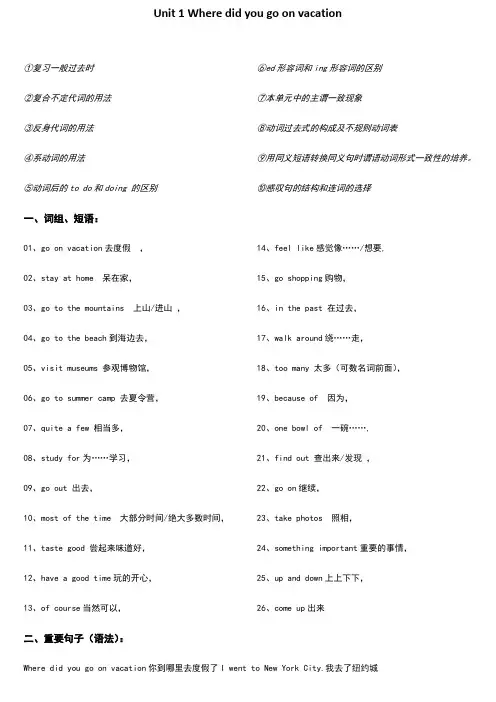
Unit 1 Where did you go on vacation①复习一般过去时②复合不定代词的用法③反身代词的用法④系动词的用法⑤动词后的to do和doing 的区别⑥ed形容词和ing形容词的区别⑦本单元中的主谓一致现象⑧动词过去式的构成及不规则动词表⑨用同义短语转换同义句时谓语动词形式一致性的培养。
⑩感叹句的结构和连词的选择一、词组、短语:01、go on vacation去度假,02、stay at home 呆在家,03、go to the mountains 上山/进山,04、go to the beach到海边去,05、visit museums 参观博物馆,06、go to summer camp 去夏令营,07、quite a few 相当多,08、study for为……学习,09、go out 出去,10、most of the time 大部分时间/绝大多数时间,11、taste good 尝起来味道好,12、have a good time玩的开心,13、of course当然可以,14、feel like感觉像……/想要,15、go shopping购物,16、in the past 在过去,17、walk around绕……走,18、too many 太多(可数名词前面),19、because of 因为,20、one bowl of 一碗……,21、find out 查出来/发现,22、go on继续,23、take photos 照相,24、something important重要的事情,25、up and down上上下下,26、come up出来二、重要句子(语法):Where did you go on vacation你到哪里去度假了I went to New York City.我去了纽约城Did you go out with anyone 你出去带人吗No, No one was here. Everyone was on vacation.不,没有人在这儿。
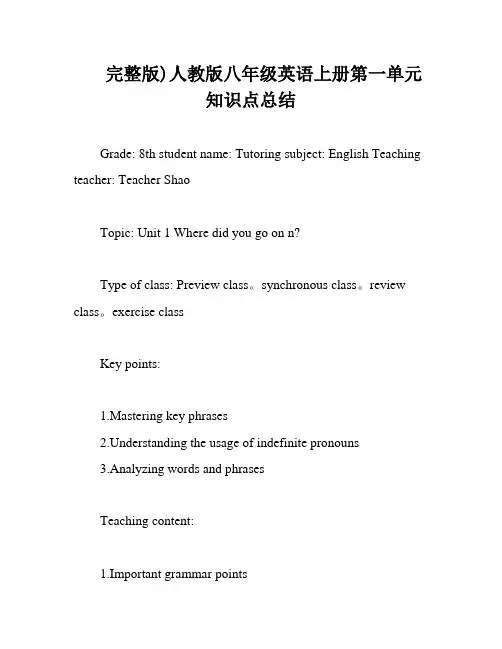
完整版)人教版八年级英语上册第一单元知识点总结Grade: 8th student name: Tutoring subject: English Teaching teacher: Teacher ShaoTopic: Unit 1 Where did you go on n?Type of class: Preview class。
synchronous class。
review class。
exercise classKey points:1.Mastering key phrases2.Understanding the usage of indefinite pronouns3.Analyzing words and phrasesTeaching content:1.Important grammar pointsUnit 1 Where did you go on n。
go on nstay at homego to the mountainsgo to the beachvisit museumsquite a fewstudy formost of the timetaste goodhave a good timefeel likego shoppingwalk aroundbecause ofone bowl ofthe next dayfind outgo ontake photossomething importantup and downcome upbuy sth。
for sb。
/ buy sb。
sth。
taste + adj。
look + adj。
nothing but + verbseem + (to be) + adj。
arrive in + big place / arrive at + small place decide to do sth。
try doing sth。
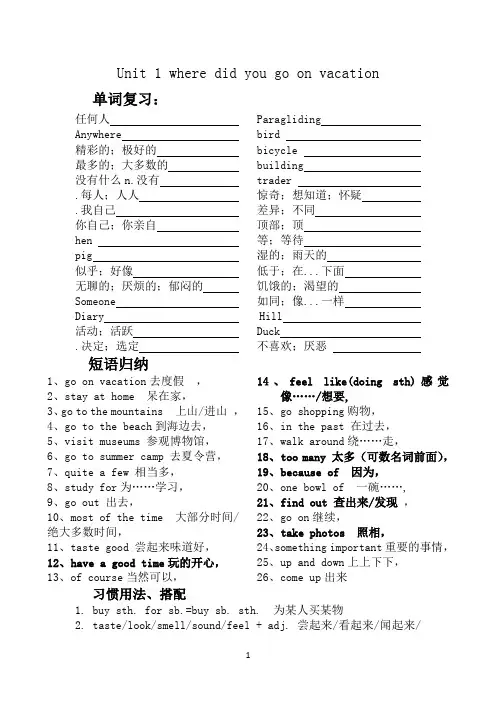
Unit 1 where did you go on vacation 单词复习: 任何人 Anywhere 精彩的;极好的 最多的;大多数的 没有什么n.没有 .每人;人人 .我自己 你自己;你亲自 hen pig 似乎;好像 无聊的;厌烦的;郁闷的 Someone Diary 活动;活跃 .决定;选定 Paragliding bird bicycle building trader 惊奇;想知道;怀疑 差异;不同 顶部;顶 等;等待 湿的;雨天的 低于;在...下面 饥饿的;渴望的 如同;像...一样 Hill Duck 不喜欢;厌恶 短语归纳1、go on vacation 去度假 ,2、stay at home 呆在家,3、go to the mountains 上山/进山 ,4、go to the beach 到海边去,5、visit museums 参观博物馆,6、go to summer camp 去夏令营,7、quite a few 相当多,8、study for 为……学习,9、go out 出去,10、most of the time 大部分时间/绝大多数时间,11、taste good 尝起来味道好,12、have a good time 玩的开心,13、of course 当然可以, 14、feel like(doing sth)感觉像……/想要, 15、go shopping 购物, 16、in the past 在过去, 17、walk around 绕……走, 18、too many 太多(可数名词前面), 19、because of 因为, 20、one bowl of 一碗……, 21、find out 查出来/发现 , 22、go on 继续, 23、take photos 照相, 24、something important 重要的事情, 25、up and down 上上下下, 26、come up 出来习惯用法、搭配1. buy sth. for sb.=buy sb. sth. 为某人买某物2. taste/look/smell/sound/feel + adj. 尝起来/看起来/闻起来/听起来/摸起来……3. have nothing to do but + V.(原形) 除了……之外什么都没有There was nothing much to do in the evening but read.晚上除了读书以外无事可做。
Unit11. 疑问词how的用法(1)用什么手段,方法/交通工具How did he do it? / I don’t know how to swim.How do you come to school?(2)情况如何(指身体健康状况)How are you?(3) how many,how much表示“多少"how many后接可数名词复数,how much接不可数名词。
(4)how often是对动作发生的“次数"提问,询问的是频率“多久一次”(5)How old。
.?询问年龄How old are you?I am five.(6) How about…? ……如何?……怎么样?How about going to the movies?2. time表示不可数名词,意为“时间”。
What time is it?表示可数名词,意为“次数,倍数"—-—-————注意“次数"的表达方法一次 once,两次 twice,三次或三次以上用基数词加上times:three times、five times、one hundred times.表示“……几次”的表达方法是:once a day/ a week/ a month/ a year twice a day/ a week/ a month/ a year 3.How often do you shop?/How often do you exercise?--—-————exercise v/n shop v/ n1)He often exercises on weekends. We often do / take exercise(做运动)on weekends。
2)We often shop on weekends。
There are many shops in the neighborhood.4. As for homework,most students do homework every day。
新课标八年级上册英语单元知识点归纳Unit1 Where did you go on vacation?短语归纳1.go on vacation去度假2.stay at home待在家里3.go to the mountains去爬山4.go to the beach去海滩5.visit museums 参观博物馆6.go to summer camp去参加夏令营7.quite a few相当多8.study for tests为测验而学习9.go out出去10.most of the time大部分时间11.have a good time doing=have fun doing =enjoy oneself玩得高兴12.of course=sure =certainly当然13.feel like给……的感觉;感受到14.go shopping去购物15.in the past在过去16.walk around四处走走17.because of+名词短语:因为because+句子18. a/one bowl of…一碗……19. the next day第二天20.drink tea喝茶21.find out找出;查明22.go on继续23.take photos照相24.something important重要的事25.up and down上上下下e up出来come out 出版发行27.go out with anyone 跟别人出去28.say about 发表对…看法29.rain hard 雨下得大30.too much+不可数名词太多too many+可数名词复数太多much too+形容词太用法:1.buy sth. for sb. / buy sb. sth.为某人买某物2.taste / look/sound/smell good. 尝起来/看起来/听起来/闻起来不错3.nothing…but+动词原形除了……之外什么都没有4.seem+(to be)+ adj. 看起来……5.arrive in+大地点/ arrive at+小地点/get to +地点/reach +地点到达某地6.decide to do sth.决定去做某事7.try doing sth.尝试做某事/ try to do sth.尽力去做某事8.forget doing sth.忘记做过某事/ forget to do sth.忘记做某事9.enjoy doing sth.喜欢做某事10. want to do sth.想去做某事11.start doing sth.开始做某事12.stop doing sth. 停止做某事13.dislike doing sth. 不喜欢做某事14.keep doing sth.继续做某事keep on doing sth 不停做某事15.Why not do. sth.=why don’t you do sth为什么不做……呢?16.so+adj.+that+从句如此……以至于……17.tell sb. (not) to do sth. 告诉某人(不要)做某事18.enough +名词,形容词+enough19.not really .真的没有。
Unit 1 Where did you go on vacation?一、词汇与短语● 重点单词A部分1.anyone pron. 任何人2.anywhere adv. 在任何地方3.wonderful adj. 精彩的;绝妙的4.few adj. & pron. 不多;很少5.most adj. adv. & pron. 最多;大多数6.something pron. 某事;某物7.nothing pron. 没有什么;没有一件东西8.everyone pron. 每人;人人;所有人9.myself pron. 我自己;我本人10.Yourself pron. 你自己;您自己11.hen n. 母鸡12.pig n. 猪13.seem v. 好像;似乎;看来14.bored adj.厌倦的;烦闷的15.diary n. 日记;记事簿B部分1.enjoyable adj.有乐趣的;令人愉快的2.activity n.活动3.decide v.决定;选定4.try v. 尝试;设法;努力5.paragliding n.滑翔伞运动6.bird n.鸟7.bicycle n.自行车;脚踏车8.building n.建筑物;房子9.trader n.商人10.wonder v.想知道;琢磨11.difference n.差别;差异12.top n.顶部;表面13.wait v.等待;等候14.umbrella n. 伞;雨伞15.wet adj.湿的;潮湿的;下雨的16.below prep. & adv. 在…下面;到…下面17.enough adj. & adv.足够的(地);充足的(地);充分的(地)18.dislike v. & n.不喜爱(的事物);厌恶(的事物)19.as adv.像…样;如同conj.当…时;如同20.hill n.小山;山丘21.duck n.鸭22.hungry adj.饥饿的● 重点短语A部分1.go on vacation 去度假2.stay at home 待在家里3.go to the mountains 去爬山4.go to the beach 去海滩5.visit museums 参观博物馆6.go to summer camp 去参加夏令营7.quite a few 相当多;不少8.study for…为…而学习9.go out 出去10.most of the time 大部分时间11.taste good 尝起来好吃12.have a good time 玩得高兴13.go shopping 去购物14.of course 当然;自然15.buy sth. for sb. /buy sb. sth. 给某人买某物B部分1.arrive in/at 到达2.decide to do sth. 决定去做某事3.try doing sth. 尝试做某事4.forget to do sth. 忘记做某事5.feel like给的感觉;感受到6.in the past 在过去7.wait for 等候8.because of 因为9.the next day 第二天10.take photos 照相11.find out 找出;查明12.up and down 上上下下● 重点句子A部分1.Where did you go on vacation? 你去哪儿度假了?2.Long time no see.好久不见。
八上英语人教版第一单元知识点八上英语人教版第一单元的知识点包括:
1.描述人物外貌和性格特征:
-外貌:形容词描述人的外貌特征,如:tall(高的)、short (矮的)、thin(瘦的)等。
-性格:形容词描述人的性格特点,如:friendly(友好的)、kind(善良的)、hardworking(努力的)等。
2.打招呼和介绍自己:
-打招呼:问候语和回答问候语,如:How are you?(你好吗?)和I'm fine, thank you.(我很好,谢谢。
)
-介绍自己:告诉别人自己的名字、年龄、国籍等个人信息,如:My name is…(我叫……)和I am…years old.(我……岁了。
)
3.数字和电话号码:
-数字:英语中的数字读法和书写形式,如:one(一)、two (二)、three(三)等。
-电话号码:问电话号码和告诉电话号码的表达方式,如:What's your telephone number?(你的电话号码是多少?)和My telephone number is…(我的电话号码是……)。
4.询问和回答国籍和所在地:
-询问:Where are you from?(你来自哪里?)
-回答:I am from…(我来自……)。
5.询问和回答年龄:
-询问:How old are you?(你几岁?)
-回答:I am…years old.(我……岁了。
)
以上是八上英语人教版第一单元的主要知识点,希望对你有帮助!。
Unit 1 Where did you go on vacation?【重点单词】anyone ['eniwʌn] pron.任何人anywhere ['eniweə(r)] adv.在任何地方wonderful ['wʌndəfl] adj.精彩的;极好的few [fjuː]adj.& pron.不多;很少most [məʊst] adj.,adv. & pron.最多;大多数something ['sʌmθɪŋ] pron.某事;某物nothing ['nʌθɪŋ] pron.没有什么;没有一件东西myself [maɪ'self] pron.我自己;我本人everyone ['evriwʌn] pron.每人;人人yourself [jɔː'self] pron.你自己;您自己hen [hen] n.母鸡seem [siːm] v.似乎;好像;看来bored [bɔːd] adj.厌倦的;烦闷的someone ['sʌmwʌn] pron.某人diary ['daɪəri] n.日记;记事簿activity [æk'tɪvəti] n.活动decide [dɪ'saɪd] v.决定;选定try [traɪ] v.& n.尝试;设法;努力paragliding ['pærəɡlaɪdɪŋ] n.滑翔伞运动bird [bɜːd] n.鸟bicycle ['baɪsɪkl] n.自行车building ['bɪldɪŋ] n.建筑物;房子trader ['treɪdə(r)] n.商人wonder ['wʌndə(r)] v.想知道;琢磨difference ['dɪfrəns] n.差别;差异top [tɒp] n.顶部;表面wait [weɪt] v.等待;等候umbrella [ʌm'brelə] n.伞;雨伞wet [wet] adj.湿的;潮湿的;下雨的below [bɪ'ləʊ] prep.在……下面;到……下面enough [ɪ'nʌf] adj.&adv.足够的(地);充足的(地);充分(的)地hungry['hʌŋɡri] adj.饥饿的as [əz] adv.像……一样;如同duck [dʌk] n.鸭肉;鸭dislike [dɪs'laɪk] v..& n.不喜爱(的事物);厌恶(的事物)【重点短语】1. go on vacation 去度假2. stay at home 待在家3. go to the mountains 去爬山;去山里4. go to the beach 去海边5. visit museums 参观博物馆6. go to the summer camp 去夏令营7. quite a few 相当多;不少8. study for为……学习9. go out 出去10. most of the time 大部分时间11. taste good 尝起来味道好12. have a good time 玩得开心13. of course 当然;自然14. feel like 给……的感觉;感受到15. go shopping 去购物16. in the past 在过去17. walk around 绕……走18. too many 太多(用于可数名词前)19. because of 因为20. one bowl of 一碗……21. find out 查明;发现22. go on 继续23. take photos 照相;拍照24. something important 重要的事情25. up and down 上上下下26. come up 出现【重点句型】1. —Where did you go on vacation?你到哪里去度假了?—I went to New York City.我去了纽约。
Unit1 Where did you go on vacation?一、书本重要语法点梳理go on vacation去度假stay at home待在家里go to the mountains去爬山go to the beach去海滩visit museums 参观博物馆go to summer camp去参观夏令营quite a few相当多study for为……而学习go out出去most of the time大部分时间taste good尝起来很好吃have a good time玩得高兴of course当然feel like给……的感觉;感到go shopping去购物in the past在过去walk around四处走走because of因为one bowl of…一碗……the next day第二天drink tea喝茶find out找出;查明go on继续take photos照相something important重要的事up and down上上下下come up出来buy sth. for sb. / buy sb. sth. taste + adj. 尝起来……look+adj. 看起来……nothing…but+动词原形除了……之外什么都没有seem+(to be)+ adj. 看起来……decide to do sth.决定去做某事stop doing sth. 停止做某事try doing sth.尝试做某事try to do sth.尽力去做某事forget doing sth.忘记做过某事forget to do sth.忘记做某事enjoy doing sth.喜欢做某事want to do sth.想去做某事start doing sth.开始做某事start to do sth.dislike doing sth. 不喜欢做某事keep doing sth.继续做某事Why not do. sth.?为什么不做……呢?so+adj.+that+从句如此……以至于……tell sb. (not) to do sth. 告诉某人(不要)做某事语法:不定代词1)something,anything,nothing,everything是指物的不定代词。
somebody,someone,anybody,anyone,nobody,everybody,everyone 是指人的不定代词。
somewhere,anywhere,nowhere,everywhere 是指地点的不定代词。
2)当形容词修饰something, anything, nothing, everything等不定代词时,放在这些词的后面;3)这些不定代词做主语时,谓语动词用第三人称单数。
如:Is everybody here? 大家都到齐了吗?4)something,somebody,someone,somewhere用于肯定句及表示请求或建议的疑问句中,而anything,anybody,anyone,anywhere 用于否定句及疑问句中。
如:Did you do anything interesting? 你做了有趣的事吗?(表疑问)Why don’t you visit someone with me? 你为什么不跟我一起去拜访下某个人呢?(表建议)1.表示提建议的句子:①What/ how about +doing?What/ How about going shopping?②Why don’t you + do sth.? 如:Why don’t you go shopping?③Why not + do sth. ? 如:Why not go shopping?④Let’s + do sth. 如:Let’s go shopping⑤Shall we/ I + do sth.? 如:Shall we/ I go shopping?2.quite a few 相当多a few 与a little 的区别,few 与little 的区别⑴ a few 一些修饰可数名词a little 一些修饰不可数名词两者都表肯定意义如:He has a few friends. 他有一些朋友。
There is a little sugar in the bottle. 在瓶子里有一些糖。
⑵ few 少数的修饰可数名词little 少数的修饰不可数名词但两者都表否定意义如:He has few friends. 他没有几个朋友。
There is little sugar in the bottle.在瓶子里没有多少糖。
3.Still no one seemed to be bored. 仍然没有人感到烦闷。
1)seem意为“好像;似乎;看来”,是个连系动词,构成的短语有:seem to do sth. 好像做某事如:They seem to talk in class. 他们似乎上课说话。
seem(to be)+adj. 似乎...... 如:He seemed ( to be) ill yesterday. 昨天他似乎病了。
It seems that + 从句似乎...... 如:It seems that he was ill yesterday. 昨天他似乎病了。
2)bored 作形容词,意为“烦闷的;厌倦的”其主语是某人;而boring 也是形容词,其主语是某物。
如:①My parents ask me to do homework all day. I feel bored.我父母整天叫我做作业,我感到很厌倦。
②Doing homework all day is a little boring. 整天做作业有点无聊。
相类似的词语还有:interested adj. 感兴趣的interesting adj. 有趣的surprised adj. 感到惊奇的surprising adj. 惊奇的tired 累的tiring 令人疲惫的excited 兴奋的exciting 令人兴奋/激动的amazed 惊讶的amazing 令人惊讶的4. 辨析:get to/reach/arrive牢记:相同点:都是“到达“的意思不同点:get to+地点/reach+地点arrive at+小地点(车站等)/arrive in+大地点(国家等)注意:若他们后面要加地点副词here,there,home等,则不需要加介词。
5. enjoy doing sth . 喜欢做…乐意做… 如:She enjoys playing football. 她喜欢踢足球。
enjoy oneself 过得愉快如:He enjoyed himself. 他过得很愉快。
跟它意思相近的词组还有have a good \ great time , have fun。
6. decide 意为“决定”,是动词。
它的名词形式为decision。
构成的短语有:decide to do sth.决定做某事make a decision to do sth.决定不要做某事,要用decide not to do sth.。
如:Li Lei has decided to go to Beijing . 李雷已经决定去北京。
7.nothing...but...意为“除......之外;只有”,如:I have nothing to do but watch TV all day long. 我整天除了看电视什么也没干。
8 . feel like 意为:“有什么感觉;感受到”,后跟宾语从句。
另外,构成短语feel like doing sth.意为“想做某事”。
如:I felt like I was a bird. 我感觉我是一只鸟。
I feel like eating.我想吃东西。
9.because of , because:because of + 名词/代词/名词性短语如:I had to move because of my job. 因为工作的原因我得搬家。
because +从句如:I do it because I like it. 我做这件事是因为我喜欢。
10.below意为“在......下面”,其反义词为above,意为“在......上面”11. bring sth.to +地点,意为“带来”,其反义词是take。
如:Please bring your book to our school. 请把你的书带到我们学校来。
Please take your book to your school. 请把你的书带到你的学校去。
12.enough 足够形容词+enough 如:beautiful enough足够漂亮enough+名词如:enough food 足够食物enough to 足够…去做…如:I have enough money to go to Beijing. 我有足够的钱去北京。
She is old enough to go to school. 她够大去读书了。
13. so … that如此…以致于引导结果状语从句,so后面接形容词、副词. that 后面跟从句。
如:She was so sad that she couldn’t say a word. 她悲伤得一句话也说不出来。
14. taste good 尝起来很好吃。
taste系动词用法“尝起来”后+形容词。
其他表示状态的系动词有:feel(觉得)keep(保持)stay(保持)seem(好像)look(看来像……)smell(闻起来)sound(听起来……)taste(尝起来……)系动词与形容词连用I feel sick。
我感到难受。
Keep quiet,please!请安静下来!The weather stays very hot。
天气非常热。
He seems very clever。
他好像很聪明。
Jim looks like his father。
吉姆长得像他父亲。
The fish smells terrible. 这鱼闻起来坏了。
That sounds a good idea。
那听起来是个好主意。
The soup tastes very delicious。
这汤尝起来非常香。